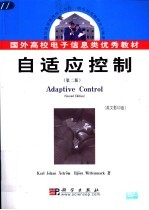
- 作 者:(瑞典)KarlJohanAstrom,(瑞典)BjornWittenmark著
- 出 版 社:北京:科学出版社
- 出版年份:2003
- ISBN:7030111478
- 标注页数:574 页
- PDF页数:589 页
请阅读订购服务说明与试读!
订购服务说明
1、本站所有的书默认都是PDF格式,该格式图书只能阅读和打印,不能再次编辑。
2、除分上下册或者多册的情况下,一般PDF页数一定要大于标注页数才建议下单购买。【本资源589 ≥574页】
图书下载及付费说明
1、所有的电子图书为PDF格式,支持电脑、手机、平板等各类电子设备阅读;可以任意拷贝文件到不同的阅读设备里进行阅读。
2、电子图书在提交订单后一般半小时内处理完成,最晚48小时内处理完成。(非工作日购买会延迟)
3、所有的电子图书都是原书直接扫描方式制作而成。
1 WHAT IS ADAPTIVE CONTROL? 1
1.1 Introduction 1
1.2 Linear Feedback 3
1.3 Effects of Process Variations 9
1.4 Adaptive Schemes 19
1.5 The Adaptive Control Problem 24
1.6 Applications 27
1.7 Conclusions 33
Problems 34
References 38
2 REAL-TIME PARAMETER ESTIMATION 41
2.1 Introduction 41
2.2 Least Squares and Regression Models 42
2.3 Estimating Parameters in Dynamical Systems 56
2.4 Experimental Conditions 63
2.5 Simulation of Recursive Estimation 71
2.6 Prior Information 78
2.7 Conclusions 82
Problems 82
References 87
3 DETERMINISTIC SELF-TUNING REGULATORS 90
3.1 Introduction 90
3.2 Pole Placement Design 92
3.3 Indirect Self-tuning Regulators 102
3.4 Continuous-Time Self-tuners 109
3.5 Direct Self-tuning Regulators 112
3.6 Disturbances with Known Characteristics 121
3.7 Conclusions 128
Problems 129
References 135
4 STOCHASTIC AND PREDICTIVE SELF-TUNING REGULATORS 137
4.1 Introduction 137
4.2 Design of Minimum-Variance and Moving-Average Controllers 137
4.3 Stochastic Self-tuning Regulators 146
4.4 Unification of Direct Self-tuning Regulators 156
4.5 Linear Quadratic STR 164
4.6 Adaptive Predictive Control 168
4.7 Conclusions 178
Problems 179
References 181
5 MODEL-REFERENCE ADAPTIVE SYSTEMS 185
5.1 Introduction 185
5.2 TheMIT Rule 186
5.3 Determination of the Adaptation Gain 194
5.4 Lyapunov Theory 199
5.5 Design of MRAS Using Lyapunov Theory 206
5.6 Bounded-Input,Bounded-Output Stability 215
5.7 Applications to Adaptive Control 230
5.8 Output Feedback 235
5.9 Relations between MRAS and STR 243
5.10 Nonlinear Systems 245
5.11 Conclusions 255
Problems 256
References 260
6 PROPERTIES OF ADAPTIVE SYSTEMS 263
6.1 Introduction 263
6.2 Nonlinear Dynamics 265
6.3 Adaptation of a Feedforward Gain 274
6.4 Analysis of Indirect Discrete-Time Self-tuners 280
6.5 Stability of Direct Discrete-Time Algorithms 293
6.6 Averaging 299
6.7 Application of Averaging Techniques 306
6.8 Averaging in Stochastic Systems 319
6.9 Robust Adaptive Controllers 327
6.10 Conclusions 338
Problems 338
References 343
7.1 Introduction 348
7 STOCHASTIC ADAPTIVE CONTROL 348
7.2 Multistep Decision Problems 350
7.3 The Stochastic AdaptiveProblem 352
7.4 Dual Control 354
7.5 Suboptimal Strategies 362
7.6 Examples 365
7.7 Conclusions 370
Problems 371
References 372
8 AUTO-TUNING 375
8.1 Introduction 375
8.2 PID Control 376
8.3 Auto-tuning Techniques 377
8.4 Transient Response Methods 378
8.5 Methods Based on Relay Feedback 380
8.6 Relay Oscillations 385
Problems 388
8.7 Conclusions 388
References 389
9 GAIN SCHEDULING 390
9.1 Introduction 390
9.2 The Principle 391
9.3 Design of Gain-Scheduling Controllers 392
9.4 Nonlinear Transformations 398
9.5 Applications of Gain Scheduling 402
9.6 Conclusions 416
Problems 416
References 417
10 ROBUST AND SELF-OSCILLATING SYSTEMS 419
10.1 Why Not Adaptive Control? 419
10.2 Robust High-Gain Feedback Control 419
10.3 Self-oscillating Adaptive Systems 426
10.4 Variable-Structure Systems 436
Problems 442
10.5 Conclusions 442
References 445
11 PRACTICAL ISSUES AND IMPLEMENTATION 448
11.1 Introduction 448
11.2 Controller Implementation 449
11.3 Controller Design 458
11.4 Solving the Diophantine Equation 462
11.5 Estimator Implementation 465
11.6 Square Root Algorithms 480
11.7 Interaction of Estimation and Control 487
11.8 Prototype Algorithms 490
11.9 Operational Issues 493
11.10 Conclusions 494
Problems 496
References 497
12 COMMERCIAL PRODUCTS AND APPLICATIONS 499
12.1 Introduction 499
12.2 Status of Applications 500
12.3 Industrial Adaptive Controllers 503
12.4 Some Industrial Adaptive Controllers 506
12.5 Process Control 517
12.6 Automobile Control 527
12.7 Ship Steering 529
12.8 Ultrafiltration 534
12.9 Conclusions 541
References 542
13.1 Introduction 545
13 PERSPECTIVES ON ADAPTIVE CONTROL 545
13.2 Adaptive Signal Processing 546
13.3 Extremum Control 550
13.4 Expert Control Systems 554
13.5 Learning Systems 557
13.6 Future Trends 559
13.7 Conclusions 561
References 562
INDEX 565
